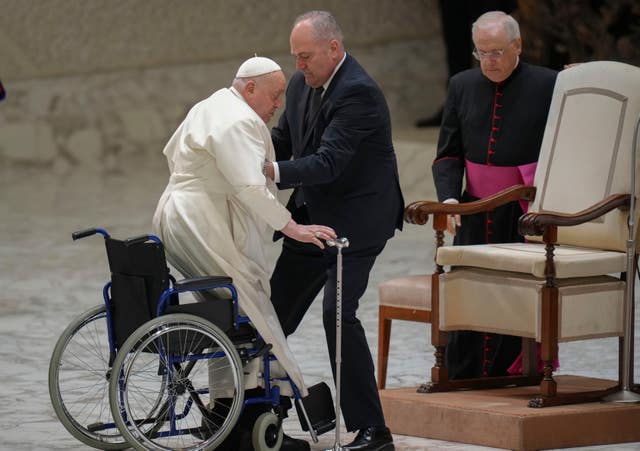Pope to remain in hospital as doctors treat ‘complex’ respiratory infection
The 88-year-old was taken to hospital on Friday.

Pope Francis’s respiratory infection is presenting a “complex clinical picture” that will require further hospital treatment, the Vatican said, as concerns grew about the increasingly frail 88-year-old pontiff.
Vatican spokesman Matteo Bruni said the results of tests conducted in recent days indicate the Pope is suffering from a polymicrobial respiratory tract infection that has necessitated a second change in his drug therapy since being admitted to hospital on Friday.
Scientists say polymicrobial diseases are caused by a mix of viruses, bacteria, fungi and parasites.
Mr Bruni said the complexity of the symptoms “will require an appropriate hospital stay”.
In a late update on Monday, Mr Bruni said Francis’s condition was “stationary” and he had resumed some work activities and reading.
Francis had part of a lung removed after a pulmonary infection as a young man and is prone to bouts of bronchitis in winter.
He was admitted to Rome’s Gemelli hospital in a “fair” condition on Friday after a week-long bout of bronchitis worsened.
Doctors confirmed a respiratory tract infection and prescribed “absolute rest” alongside unspecified drug therapies. Subsequent updates said his slight fever had gone away and that he was in “stationary” condition.
Mr Bruni said Francis ate breakfast, read the newspapers and received the Eucharist on Monday after a third peaceful night, and the parish priest of the Catholic Church in Gaza, the Rev Gabriel Romanelli, reported that Francis had maintained his daily video call to the church on Friday and Saturday night, and sent a text message on Sunday.
“We heard his voice. It’s true, it was more tired,” Mr Romanelli told Vatican News. “But we heard his voice clearly and he listened to us.”
Bronchitis, or an inflammation of the airwaves, can be relatively mild in a healthy person but can become much more severe in someone who is older or has existing lung problems, especially when they are unable to cough up and expel the accumulating mucus. Bacteria and other organisms can colonise, leading to further infection that may be harder to treat.

The Argentine pope is a known workaholic who keeps up a gruelling pace despite his increasingly precarious health.
In addition to his frequent bouts of respiratory infections in winter, he uses a wheelchair, walker or cane because of bad knees and suffers from sciatica nerve pain.
In 2021 he had 13in of his colon removed because of a narrowing, and then had a further operation in 2023 to remove intestinal scar tissue and repair an abdominal hernia.

This time, Francis insisted on finishing his morning audiences on Friday before leaving the Vatican, even though he was having trouble speaking at length because he was so short of breath.
Outside the Gemelli hospital, people were praying for the Pope, including Nigerian nuns in front of a giant statue of St John Paul II.
Sister Mary Beatrice Nnenji said prayers were necessary “because no one is strong enough on their own”.
“With age also you feel your health and especially with his workload and all the efforts he makes,” she said. “So if God wants he will go on. Let’s hope in God, we cannot go against it, whatever comes.”





